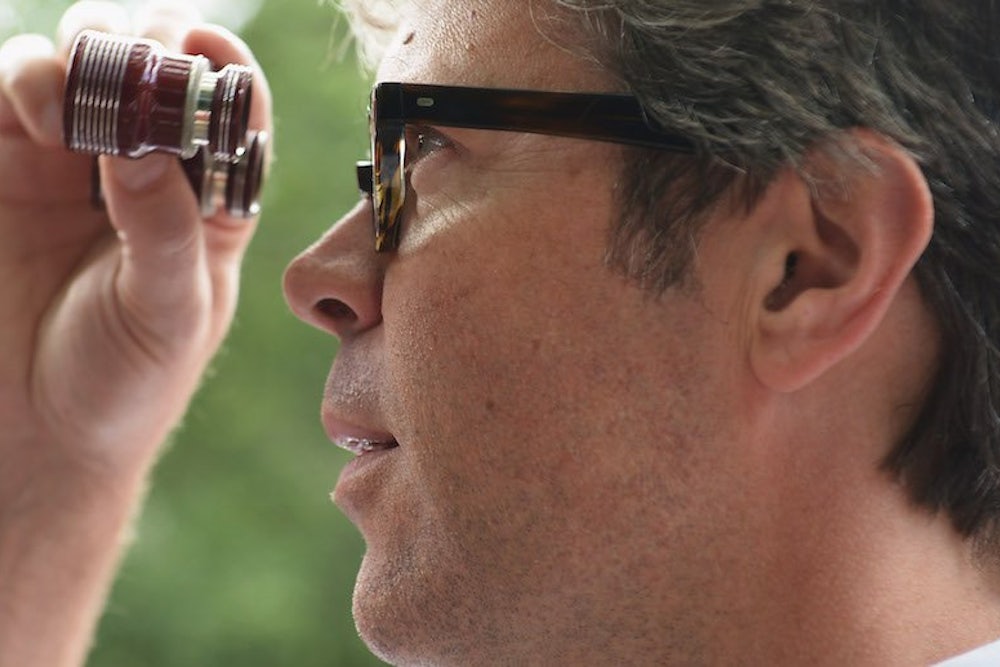Jonathan Franzen’s latest New Yorker essay offers a dim view of how humans should prioritize two causes that are, according to him, in conflict: climate change and conservation. Since nothing can be done to save the planet, he argues, environmental groups like the National Audubon Society should focus on preserving the quality of the little wilderness that's left. As if that's not depressing enough, he supports his argument with baseless claims lifted from the GOP's climate-denier playbook.
David Yarnold, president and CEO of Audubon, on Friday told me this is “one of the wackiest arguments” he’s ever heard. He has a good reason to hold a grudge. Franzen, a birder, wrote in his essay that Audubon does little more than sell holiday cards and plush-toy cardinals and bluebirds, a far cry from its heyday of activism. In the writer's view, traditional conservationist groups have hurt their own cause—like saving the birds—by shifting focus to climate change. But Franzen misrepresented an Audubon report he didn't read and never disclosed that he's on the board of a competing bird society, the American Bird Conservancy, prompting Yarnold to question the New Yorker’s editorial standards. Yarnold accused Franzen of underestimating Americans' ability to care about multiple issues at one time, and pointed to climate change for energizing many of Audubon's activists.
A far more sympathetic response came from Grist’s David Roberts. Franzen reminds him of smart people he’s always encountered who still don’t grasp, or are reluctant to grasp, the full scope and complications of climate change. They acquire a kind of tunnel vision. That would explain why Franzen knocks down the easy arguments against climate change action, while ignoring the actual policy debate (few serious people are suggesting we can fix the problem by getting on a bicycle, like Franzen suggests). Roberts's proposed fix for this tunnel vision: better storytelling.
Better stories are always welcome, but stories alone won't correct climate-change ignorance as long as the deniers are telling their own, distorting version. Franzen’s essay is a clear sign of how pervasive climate-denier memes are to Americans' everyday thinking on the issue.
Franzen isn't a denier; he accepts climate change science. He just doesn't necessarily think too-little, too-late advocacy should be a priority, considering the scale of the problem. Even so, his various arguments vaguely resemble what you often hear from politicians (many of whom don’t accept the science) as reasons for doing nothing.
Senator Marco Rubio and former Senator Rick Santorum have argued that even if they accepted the science, humans won't make much of an impact either way by taking action now. “I don't agree with the notion that...there are actions we can take today that would actually have an impact on what's happening in our climate,” Rubio said. “Even folks who accept all of the science by the alarmists on the other side, recognize that everything that's being considered by the United States will have—well, not almost, will have zero impact on it given what's going on in the rest of the world,” Santorum said.
Now consider this paragraph from Franzen's essay:
The Earth as we now know it resembles a patient whose terminal cancer we can choose to treat either with disfiguring aggression or with palliation and sympathy. We can dam every river and blight every landscape with biofuel agriculture, solar farms, and wind turbines, to buy some extra years of moderated warming. Or we can settle for a shorter life of higher quality, protecting the areas where wild animals and plants are hanging on, at the cost of slightly hastening the human catastrophe.
What an unfortunate analogy. A terminal patient faces a certain end, but with climate change there are many possible outcomes that depend on what we do now. Our current path would result in worst-case scenarios for climate change. But if we were to lower emissions in the next decade—an extremely tough feat—we’d face a somewhat reduced risk of the most extreme effects.
Second, Franzen implies the aggressive deployment of renewable energy will do nothing more than “buy some extra years,” at the risk of disfiguring the world we have left. He makes the strange assumption that wind turbines are destructive, but doesn't make any mention of the harm fossil fuel development already causes to the environment (ClimateProgress' Joe Romm pointed out fossil fuels kill many more birds than wind or solar energy do). Franzen doesn't sound much different than Republicans who mock solar and wind, like Mitt Romney did in 2012—even though renewables are becoming an economic force.
Third, Franzen assumes that acting on climate change will somehow worsen quality of life, when a whole body of research details how cutting emissions delivers many benefits to the economy and public health. That includes helping wildlife, which are also threatened by fossil fuel expansion. In just one week last fall, 122 migratory birds died after they landed in tar sands ponds in Canada—the same tar sands that climate activists hope to keep in the ground. And the proposed route for the Keystone XL pipeline, meant to carry tar sands, threatens the habitats of at least four endangered and near-endangered species—the greater sage-grouse, the swift fox, American burying beetle, and grassland bird species.
We expect such arguments from the GOP, not from a liberal essayist and novelist writing in The New Yorker (and its vaunted fact-checking department). There's no better, more worrisome sign that the climate-change deniers' mythical narrative is going mainstream. The more people buy these weak arguments, the less likely we'll see political action—and diagnosing the planet with a terminal illness becomes a self-fulfilling prophecy.
